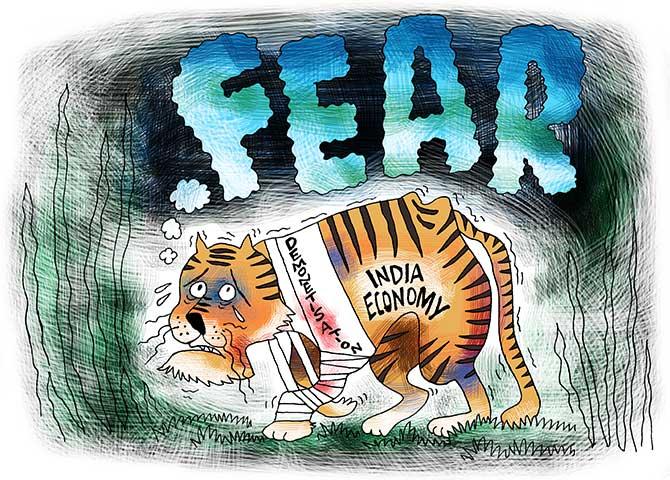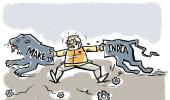NSO has pegged economic growth at 5 per cent in 2019-20 in its second advance estimates.

India's economic growth slowed to a near 7-year low of 4.7 per cent in October-December 2019 on continued slump in manufacturing, and now faces the next big challenge of coronavirus outbreak stifling global growth.
Despite being one of the strongest periods due to festival season and higher rural spending driven by kharif harvest, October-December was the third straight quarter of growth decline and the lowest rate in 27 quarters.
The 4.7 per cent expansion in the third quarter of the current financial year compares with a revised 5.1 per cent growth witnessed in the previous three months and 5.6 per cent expansion in the same period of the previous year, according to official data released on Friday.
The government retained its estimate of 5 per cent GDP growth for the fiscal year through March, the lowest for 11 years.
This, after the first quarter growth was revised upwards to 5.6 per cent from earlier estimate of 5 per cent.
While agriculture output rose 3.5 per cent versus 3.1 per cent in the previous quarter, mining grew 3.2 per cent versus 0.2 per cent in the July-September period.
Manufacturing output declined 0.2 per cent while electricity growth fell 0.7 per cent compared with a 3.9 per cent growth earlier.
The only bright spot in the third quarter of 2019-20 fiscal was minor improvement in private final consumption expenditure, which grew 5.9 per cent.
Going forward, the coronavirus epidemic has added a complexity to economic recovery with production halts in its epicentre China -- source of more than one-fifth of India's total non-oil, non-gold imports, posing downside risk to domestic manufacturing.
Commenting on the GDP data, economic affairs secretary Atanu Chakraborty said the decline in economic growth has bottomed out.
Industry body Assocham also said green shoots are visible in sectors like coal, cement and agriculture, but India Ratings said there are no clear sign of economic recovery in the short-run.
Sreejith Balasubramanian, economist - fund management, IDFC AMC, said India's growth could be impacted by the coronavirus depending on the duration and intensity of both its spread and containment measures across the world.
Rumki Majumdar, economist, Deloitte India, said while India's exposure to the external world is low because of the country's limited presence in the global supply chain, it is highly unlikely that it will remain immune to a worldwide slowdown as a shortage of manufacturing and intermediate products (procured from China) are likely to disrupt industries and businesses globally.
"Investments, which are in the slow motion mode (contracting in the past two quarters), are unlikely to pick up anytime soon.
“Industries such as automobiles, technology, pharma, and fashion have some exposure to Chinese imports of raw and intermediate inputs.
“If the shutdown in China is more protracted, production in Indian industries could be hit," Majumdar said.
India Ratings said since the NSO advanced estimate pegs the GDP growth for FY20 at 5 per cent, the fourth quarter (January-March) of FY20 will need to have the same expansion as Q3, which is achievable.
Majumdar further said with the fiscal deficit for FY2020 pegged at 3.8 per cent, which is 0.5 per cent higher than the earlier target, "the question is how much can the government boost growth through higher spending.
“Any further monetary policy easing is unlikely as long as inflation remains high."
The GDP growth for the December quarter is the lowest since January-March of 2012-13, when it stood at 4.3 per cent.
According to the data released by the National Statistical Office (NSO), the gross value added (GVA) growth in the manufacturing sector contracted by 0.2 per cent in the third quarter of this fiscal from 5.2 per cent expansion a year ago.
However, the farm sector GVA growth was up at 3.5 per cent, compared to 2 per cent growth in the corresponding period of the previous fiscal.
Construction sector GVA growth too slowed to 0.3 per cent from 6.6 per cent expansion earlier.
Mining sector growth came in at 3.2 per cent, as against a contraction of 4.4 per cent a year ago.
Electricity, gas, water supply and other utility services segment contracted by 0.7 per cent, from 9.5 per cent growth a year ago.
Similarly, trade, hotel, transport, communication and services related to broadcasting growth declined to 5.9 per cent in the third quarter from 7.8 per cent a year ago.
Financial, real estate and professional services growth was up at 7.3 per cent in Q3 FY2019-20 from 6.5 per cent.
Public administration, defence and other services reported improvement with 9.7 per cent rise during the quarter under review, from 8.1 per cent a year earlier.
During April-December 2019, the GDP growth reduced to 5.1 per cent as compared to 6.3 per cent in the same period a year ago.
"GDP at Constant (2011-12) Prices in Q3 of 2019-20 is estimated at Rs 36.65 lakh crore, as against Rs 35.00 lakh crore in Q3 of 2018-19, showing a growth of 4.7 per cent," the NSO said in a statement.
"The per capita income at current prices during 2019-20 is estimated to be Rs 134,432, showing a rise of 6.3 percent as compared to Rs 1,26,521 during 2018-19," it added.
Meanwhile, data released by the commerce ministry showed that eight core industries recorded a 2.2 per cent growth in January, helped by expansion in the production of coal, refinery products and electricity.











 © 2025
© 2025